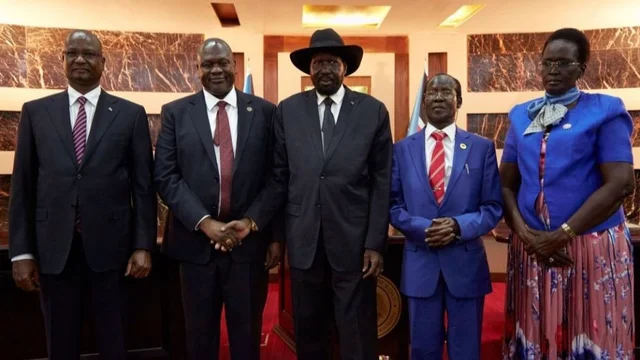
South Sudan Presidency (Photo: Courtesy).
The clock is ticking but every day doubt is growing. For South Sudan’s international partners, civil society and observers, April is the last chance to ensure that the first elections in the young nation’s history take place, as planned, in December.
South Sudan has had a long wait to elect its leaders and lawmakers ever since its hard-won independence from Sudan in 2011.
Despite oil riches, the world’s youngest country remains paralysed by chronic violence, political instability, poverty and natural disasters.
After a devastating 2013-2018 civil war between forces loyal to President Salva Kiir and Riek Machar, a peace agreement led to an uneasy unity government, with Machar serving as vice president.
The deal laid out a “transition” period to pave the way for general elections.
But to the exasperation of the international community, persistent disputes have left key provisions of the deal unfulfilled and transition timelines repeatedly delayed.
– What’s the situation now? –
The latest “roadmap” calls for polls in December 2024.
But Nicholas Haysom, UN mission chief in South Sudan, warned in December 2023: “As things stand, the country is not yet in a position to organise credible elections.”
He told the UN Security Council a “critical mass” of prerequisites had to be in place by April to enable free and fair elections.
Three months on, there is no sign of major progress.
The unification of rival pro-Kiir and pro-Machar forces, a crucial element for the smooth running of a vote, is incomplete.
About 55,000 men have undergone training in an initial phase, but only 4,000 are deployed, Charles Tai Gituai, head of the RJMEC, the body supervising implementation of the peace deal, said in February.
The absence of a national army is particularly concerning in a country riven by intercommunal violence, which cost 406 lives in the last quarter of 2023, according to the UN.
To prepare for polls, South Sudan has created two institutions, the Council of Political Parties and the National Electoral Commission.
But they are not yet fully operational due to a lack of funding and remain a source of controversy.
The election commission’s composition has been criticised as too partisan and opposition parties have lashed out at an “exorbitant” $50,000 registration fee.
And the vital process of drafting a constitution is 18 months behind schedule.
– Elections still possible? –
For months, the UN, African Union and the “troika” of Britain, Norway and the United States which sponsored independence, have been pressing Kiir and Machar to work together on the elections.
Kiir has reiterated his desire to meet the deadlines.
But Machar has threatened to boycott any vote if key provisions of the 2018 agreement are not implemented, particularly the drafting of a constitution which he says could take 24 months.
“Salva Kiir 100 percent is interested in the elections… because he is tired of being tied down by the peace agreement,” said Boboya James Edimond, executive director of the Juba-based Institute for Social Policy and Research.
“Riek Machar is afraid of losing power… his interest is to make sure that all the provisions of the peace agreement must be implemented to spirit and letter so that it puts some time for him to be in power.”
Organising nationwide elections in eight months is a complicated task in a country plagued by insecurity and with limited infrastructure.
South Sudan has also been hit by a drop in vital oil revenues because of a damaged pipeline in war-torn Sudan which could, say analysts, further delay the vote.
“If we were to rush elections, there’s a high chance the country will fall back into violence,” warned Edmund Yakani, head of civil society group the Community Empowerment for Progress Organisation (CEPO).
“There’s a need to have a consensus for not rushing elections but also not delaying it too much.”
– ‘Abridged election’ or another delay? –
In a March 15 letter seen by AFP, the RJMEC called on the protagonists to study two “viable options”: conducting an “abridged election” or again revising transition timelines.
Kiir’s side has proposed polls in December for the presidency and governors of South Sudan’s 10 states, with legislative polls a year later.
Machar’s party told the RJMEC it was ready for “dialogue” provided there is a mediator, a role now taken by Kenya.
Yakani said such dialogue should not be limited to political players, often driven by their own interests, but include civil society, religious leaders, youth and women.
He said people were “not interested” in further delays, but if there was another extension of the transition period “it needs a clear timeline”.
“If they fail to make decisions by late April it will be a disaster.”
Support Eye Radio, the first independent radio broadcaster of news, information & entertainment in South Sudan.
Make a monthly or a one off contribution.
Copyright 2024. All rights reserved. Eye Radio is a product of Eye Media Limited.